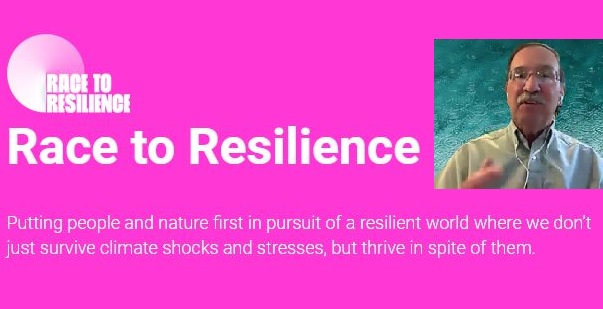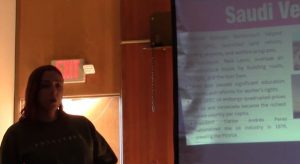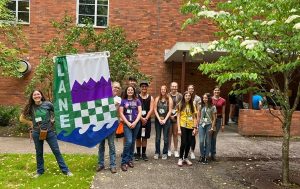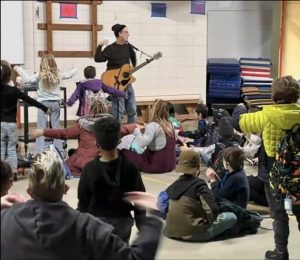With ‘relentless adversities’ ahead, local UN partner supports mutual aid for all
8 min read
Presenter: Bob Doppelt issued a call to action this month. It’s part of a United Nations Race to Resilience campaign, encouraging communities to prepare for a new era of mutual aid for all. Speaking Sept. 30, Bob Doppelt:
Bob Doppelt (International Transformational Resilience Coalition): Just a quick background on our organization, International Transformational Resilience Coalition. We were formed back in 2013, trying to just build awareness of the mental health and psychosocial impacts of the climate emergency, and we ran workshops and conferences on this issue. Mostly we were focused on individualized mental health services at the time.
[00:00:35] And then a bunch of members came to us and said—we have members from all over the world— they said, ‘We cannot keep up with the disasters. We have to come up with a very different approach than just treating individuals one at a time after they’re traumatized.’
[00:00:48] So we launched what we thought it was going to be a six-month research project, became a two-year project, reading research, asking people all over the world, but trying to find out: Has anybody got an approach that can prevent and heal pervasive mental health and psychosocial issues generated by relentless adversities? ‘Cause that’s what the climate / ecosystem / biodiversity crisis is.
[00:01:10] And it turns out there is an approach: It’s called a public health approach to mental health. And in many mid- and lower-income nations, it’s called the mental health and psychosocial support group. And so that helped us learn what this is about. We started running community practice about this and with people all over the world.
[00:01:28] And then early last year, almost two years ago now, we became a member of the UN High Level Climate Champion Race to Resilience campaign and that’s where the global call to action for mutual support for all came from.
[00:01:41] Presenter: So why should we be concerned about the climate / ecosystem / biodiversity crisis? Bob Doppelt:
[00:01:47] Bob Doppelt (International Transformational Resilience Coalition): Last year, 2024, global average surface temperatures increased above preindustrial levels by 1.5 degrees Celsius, 2.7 degrees Fahrenheit, for the first time ever in recorded history.
[00:02:01] Then this year, a study by the World Meteorological Association says temperatures are going to rise by 2 degrees Celsius, 3.6 degrees Fahrenheit, at least temporarily in many parts of the world within five years.
[00:02:18] And at the same time, this year, Dr. James Hansen, one of the noted climate scientists in the world, led a team that released a study that showed that average global temperatures will rise by 2 degrees Celsius, 3.6 degrees Fahrenheit, permanently, everywhere, in no more than 20 years—and likely much less.
[00:02:38] So this is really a very, very serious issue because 2 degrees Celsius is basically a civilization-altering event. But on top of that, seven of the nine critical planetary boundaries, as scientists call them, have now been breached: climate change; biodiversity integrity; land system change; freshwater change; modifications of biochemical flows; ocean acidification; introduction of novel entities—all these are in dangerous areas and getting worse.
[00:03:09] And scientists have issued a stark warning because those three-quarters of the Earth’s ecological system support are outside their safe zone and all show worsening trends. We really have a real threat on our hands that we must address.
[00:03:27] And of course, as all of you know, the impacts of the climate / ecosystem / biodiversity crisis include more frequent, extreme, prolonged disasters that are increasingly traumatizing billions of people around the world.
[00:03:39] Twenty percent to 40% of the people who are directly impacted by one of these disasters can experience mental health, psychosocial, and/or physical health issues. And 20% of those others, who just know somebody’s impacted or even watch it, can be traumatized.
[00:03:53] And BIPOC (Black, Indigenous, people of color), low-income and other populations are at least initially most affected. Windstorms, snowstorms, heat waves, sea level rise, droughts, floods, wildfires, and many more—those disasters are combined with and activating cascading disruptions to the ecological, social and economic systems we all rely on for basic survival needs and those disruptions are stressing everyone.
[00:04:24] They’re food and water shortages and disruptions; damage to and loss of housing and shelter; damage and loss to: transportation, power, water, and other physical infrastructure; loss of businesses, jobs and incomes; new illnesses and diseases; loss of places, communities, culture and the natural environment; reduced or lost sense of safety and security; and many other surprising disruptions that create these stress pileups people are feeling.
[00:04:53] So, unless we build population-level mental wellness and transformation resilience, the impacts that we’re seeing are going to create a global epidemic of stresses, distresses, and traumas.
[00:05:04] Presenter: He said we are seeing individual, community, and societal traumas. Bob Doppelt:
[00:05:10] Bob Doppelt (International Transformational Resilience Coalition): Most of us understand what a psychological, emotional, or spiritual distress is: It’s worrying about what might happen to us in the future, what might happen to our children, our families in the future; ecoanxiety, solastalgia and other terms are there, and many, many people are experiencing that.
[00:05:29] But we’re also seeing individual traumas widespread around the world, and that is when an event or series of events shatters the deeply-held views people hold about the nature of the world and how they should act and think in it. And it leads them to feelings of hopelessness and creates many kinds of mental health issues: anxiety, depression, PTSD, post-traumatic stress disorder, complicated grief, and others.
[00:05:58] But we’re also seeing widespread community traumas occur. And this is sort of the same kind of reaction as individual traumas, but at a much larger scale—an entire community can experience these kind of reactions, or groups that hold the same religious or cultural backgrounds can experience it. So this happens when an entire community is destroyed by a wildfire, or by a flood, or by a hurricane, and we’re seeing this many places.
[00:06:29] But we’re also seeing then societal traumas. And this is the same reaction again as those community traumas, but at a much larger scale, outside of just a specific geographic area, where large numbers of people have their sense of how they make sense of the world, how they react to and think and act in it, becomes shattered.
[00:06:52] The COVID-19 pandemic was a societal trauma, went way beyond an individual community and way beyond individuals themselves. And unless we institute prevention and healing initiatives worldwide, right now, the climate / ecosystem / biodiversity crisis is going to become the greatest societal trauma modern society has ever experienced.
[00:07:16] And it’s important to remember that the threats to families, communities, and society is not people with diagnosed mental health disorders. It is the vast majority of all of us now considered normal who, when their deeply-held views of the world and how they should act in it are shattered, can act in ways that harm themselves, harm other people, or harm the natural environment. That’s what traumas can do.
[00:07:46] And many, many, many more people are going to be traumatized. And those pervasive distresses and traumas can feed on themselves and become epidemics.
[00:07:59] So unless the traumas that are buried in our nervous system are released, and again, that we hold it in our nervous system and we don’t release it (that’s what causes these traumas), it can cause people to deny what’s happening, to dissociate, disconnect from reality, to blame others, attack others, sabotage themselves by misusing alcohol or drugs or other substances, or to reenact the very same practices that caused the problem in the first place.
[00:08:27] We just keep redoing it, reenacting it, trying to see if it would work itself out somehow, and it rarely does in that way. And as seen time and again throughout history, the combination of these kind of reactions can unravel families, groups, communities, and entire societies.
[00:08:47] And just as importantly, these self-protective survival reactions that result from the continual activation of the emotional brain, the limbic system, we often call them fight, flight, freeze, or fawn reactions, they also are blocking solutions to the climate / ecosystem / biodiversity crisis. People don’t want to engage in change. They just want to try to maintain their own well-being. They’re trying to get by through the day and survive.
[00:09:17] And so they oppose anything that looks like it’s going to require significant change. And that’s happening just when new thinking, innovation, and transformational changes are urgently needed to address the crisis. So it becomes a vicious cycle.
[00:09:33] Just as importantly, there’s no physical health without mental health. And this is a quote from Dr. Brock Chisholm, who is the first director of the World Health Organization, general director: ‘There is great comorbidity,’ as it’s called, ‘between mental health and physical health issues.’
It’s very common. When I have a physical health issue, I am also likely to have a mental health issue. I’m also likely have a physical health issue. And it could be the other way around: Physical health issues can cause mental health issues. Yet few people grasp this, which means that unless we get out front of these issues and institute prevention and healing mechanisms now, the pervasive distresses and traumas that are already being experienced and are coming our way are going to greatly accelerate physical health problems, and likely the cost of health care as well.
[00:10:27] Presenter: Bob said there will never be enough providers to assist everyone affected by the crisis.
[00:10:33] Bob Doppelt (International Transformational Resilience Coalition): Think about it. If you’re a mental health provider, how many people do you see in a day, or in a week, or in a month? And how many people are in your community that might be affected by the climate ecosystem or biodiversity crisis? Add that up. Can you help all those people and /or other mental health providers?
[00:10:52] And just as importantly, mental health and human services also focus downstream. They treat individuals with symptoms only after they appear. They do not proactively work upstream to use that term to prevent widespread issues by building population level mental wellness and transformation resilience.
[00:11:13] Just as importantly, disaster response and disaster mental health programs while they remain important are also insufficient to address what’s already happening and what is speeding our way. Disaster mental health and disaster response programs will remain important where, when, and for whom they exist.
[00:11:36] But in many nations and many regions and in many communities, they don’t have the capacity to form or continually support these kinds of disaster response programs. And when multiple disasters occur, the disaster response teams that do exist are often stretched in or are unable to assist all the hard-hit areas and populations.
[00:11:58] We just personally had an experience with this last year. My wife grew up near Asheville, North Carolina, in the U.S., and her sisters and their families still live there. It got hit by Hurricane Helene. There were no emergency responders or death disaster responders. For days there, it was the community, them and their neighbors and friends that helped each other. That was the key.
[00:12:24] So this focus alone has no chance of sufficiently addressing the many disasters that will occur as global temperatures rise towards 2 degrees Celsius, 3.6 degrees Fahrenheit. We must understand that we are in a very new era and that we must therefore think and act differently. And this requires actively engaging residents and providing mutual support for all.
[00:12:52] Presenter: That’s Bob Doppelt of the International Transformational Resilience Coalition. You can learn more about the Race to Resilience campaign and how to form your own local group at the website ITRCoalition.org.







